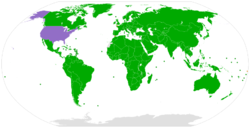Convention on the Rights of the Child
(treaty) | |
|---|---|
 Parties to the convention
Only signed, but not ratified
Non-signatory | |
| Type | file of unspecified type |
| Founded | 20 November 1989 |
| Author(s) | |
| An international treaty to afford legal rights to children, effective in almost all nations of the world except the USA. | |
The United Nations Convention on the Rights of the Child is an international treaty to protect children.
Contents
The Convention deals with child-specific needs and rights. It requires that the "nations that ratify this convention are bound to it by international law." Ratifying states must act in the best interests of the child.
In all jurisdictions implementing the Convention requires compliance with child custody and guardianship laws as every child has basic rights, including the right to life, to their own name and identity, to be raised by their parents within a family or cultural grouping, and to have a relationship with both parents, even if they are separated.
The Convention obliges states to allow parents to exercise their parental responsibilities. The Convention also acknowledges that children have the right to express their opinions and to have those opinions heard and acted upon when appropriate, to be protected from abuse or exploitation, and to have their privacy protected. It requires that their lives not be subject to excessive interference.
The Convention also obliges signatory states to separate legal representation for a child in any judicial dispute concerning their care and asks that the child's viewpoint be heard in such cases.
Child executions
The treaty prohibits execution of children. It was signed by the USA but as of 2017 has never been ratified, allowing the government to execute juveniles. The only other country, as of 1999, not to execute juveniles is Somalia.
Corporal punishment
In its General Comment 8 (2006) the Committee stated that there was an "obligation of all state parties to move quickly to prohibit and eliminate all corporal punishment and all other cruel or degrading forms of punishment of children".[1] Article 19 of the Convention states that state parties must "take all appropriate legislative, administrative, social and educational measures to protect the child from all forms of physical or mental violence",[2] but it makes no reference to corporal punishment. The Committee's interpretation of this section to encompass a prohibition on corporal punishment has been rejected by several state parties to the Convention, including Australia,[3] Canada and the United Kingdom.
Cultural relativism
Global human rights standards were challenged at the World Conference on Human Rights in Vienna (1993). One fault line at the conference was Western nations who proclaimed a universal meaning to human rights versus nations who said that human rights needed to be interpreted differently in non-Western cultures and that attempts to impose a universal definition amounted to interference in their internal affairs.[4] The latter group was led by China, Syria and Iran, and also included a number of Asian nations such as Singapore, Malaysia, Indonesia, and Vietnam. There are unresolved tensions between "universalistic" and "relativistic" approaches in the establishment of standards and strategies designed to prevent or overcome the abuse of children's capacity to work.
References
- ↑ General Comment 8 Archived 4 December 2010 at the Wayback Machine., Committee on the Rights of the Child.
- ↑ https://en.wikisource.org/wiki/UN_Convention_on_the_Rights_of_the_Child#Article_19
- ↑ https://web.archive.org/web/20110615043616/http://www.heraldsun.com.au/news/national/aussie-parents-to-defy-un-smacking-ban/story-e6frf7l6-1225843384853?from=public_rss
- ↑ https://www.nytimes.com/1993/06/15/world/us-rejects-notion-that-human-rights-vary-with-culture.html